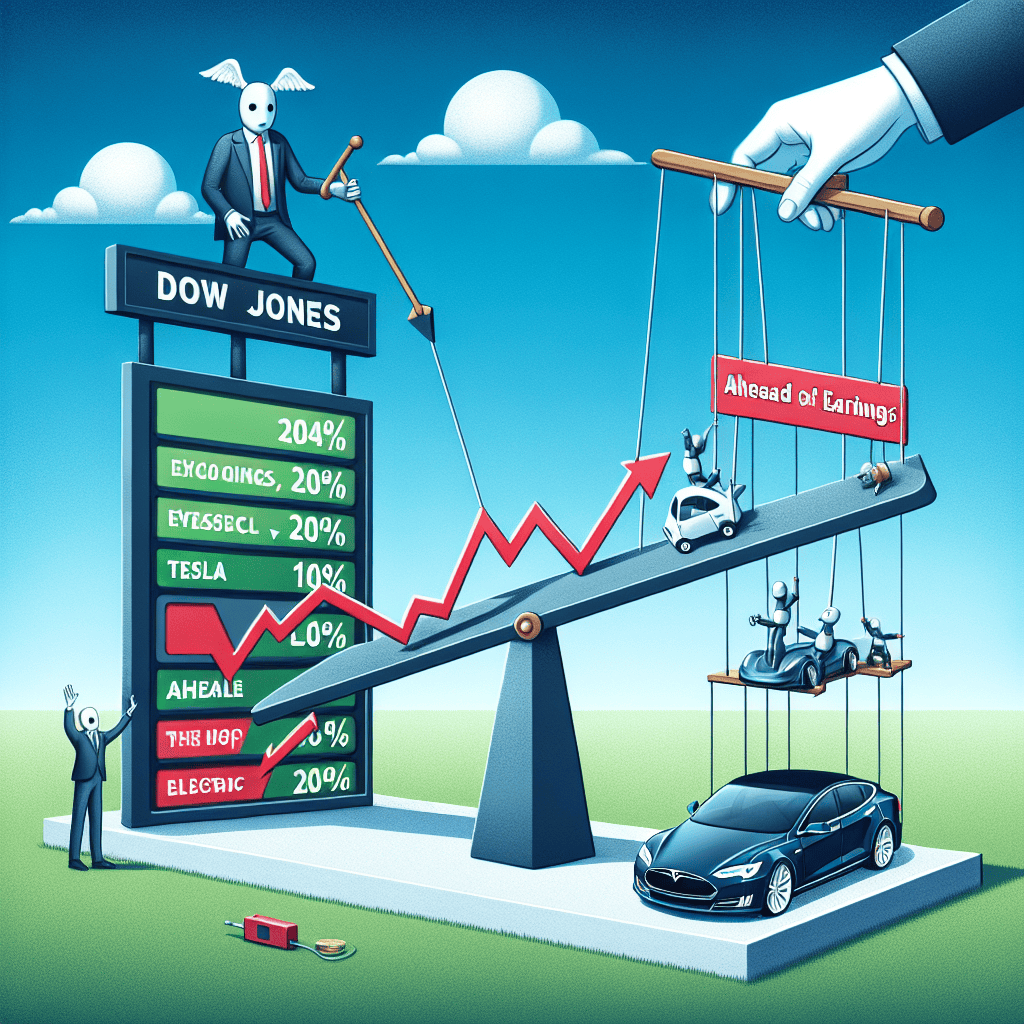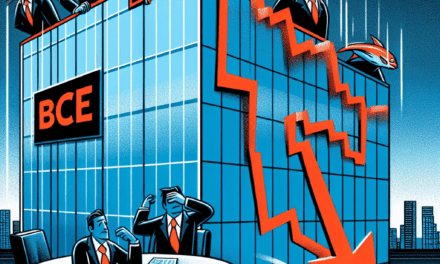“Market Turmoil: Trump Stock Soars, Tesla Wobbles, Dow Dives – Real-Time Insights”
Introduction
In a dramatic turn of events on Wall Street, the Dow Jones Industrial Average has experienced a significant decline, capturing the attention of investors and analysts alike. Amidst this turbulence, stocks associated with former President Donald Trump have surged by an astonishing 204%, marking a notable divergence in market trends. Meanwhile, Tesla’s stock is facing downward pressure ahead of its upcoming earnings report, with CEO Elon Musk’s influence and recent activities adding layers of complexity to the company’s market performance. This live market update delves into the factors driving these significant movements, offering insights into the broader economic implications and investor sentiment shaping today’s financial landscape.
Impact Of Political Events On Stock Market Volatility
The stock market is a complex ecosystem influenced by a myriad of factors, with political events often playing a pivotal role in shaping market volatility. Recent developments have underscored this dynamic, as evidenced by the dramatic fluctuations in major indices and individual stocks. The Dow Jones Industrial Average, a key barometer of the U.S. stock market, recently experienced a significant downturn. This decline can be attributed to a confluence of geopolitical tensions, economic policy shifts, and investor sentiment, all of which are deeply intertwined with the current political landscape.
Simultaneously, the stock associated with former President Donald Trump has surged by an astonishing 204%. This remarkable increase highlights the profound impact that political figures can have on market movements. Investors often react to the perceived influence and potential policy directions of political leaders, which can lead to substantial volatility. In this case, the surge in Trump’s stock may reflect investor optimism about his potential return to political prominence or the strategic moves of companies linked to his brand.
In contrast, Tesla, a company frequently in the spotlight due to its innovative approach and charismatic CEO Elon Musk, has seen its stock price drop ahead of its earnings report. This decline is not only a reflection of investor caution in anticipation of the company’s financial performance but also indicative of Musk’s significant influence on market perceptions. Musk’s public statements and actions often lead to swift market reactions, underscoring the delicate balance between corporate leadership and investor confidence.
The interplay between political events and stock market volatility is further complicated by the global economic environment. Trade policies, regulatory changes, and international relations all contribute to the uncertainty that investors must navigate. For instance, ongoing trade negotiations or diplomatic tensions can lead to market instability, as investors attempt to gauge the potential impact on global supply chains and economic growth.
Moreover, the role of technology and social media in disseminating information has amplified the speed at which political events can influence market dynamics. Investors now have access to real-time updates and analyses, which can lead to rapid shifts in market sentiment. This immediacy, while providing opportunities for informed decision-making, also increases the potential for knee-jerk reactions and heightened volatility.
In light of these factors, it is crucial for investors to adopt a strategic approach to managing their portfolios. Diversification remains a key strategy to mitigate risk, as it allows investors to spread their exposure across different sectors and asset classes. Additionally, staying informed about political developments and understanding their potential implications on the market can help investors make more informed decisions.
In conclusion, the recent fluctuations in the Dow Jones, Trump’s stock, and Tesla illustrate the significant impact that political events can have on stock market volatility. As the global political landscape continues to evolve, investors must remain vigilant and adaptable, leveraging both traditional and modern tools to navigate the complexities of the market. By doing so, they can better position themselves to capitalize on opportunities and mitigate risks in an ever-changing economic environment.
Analyzing The Surge In Trump-Related Stocks
In recent market developments, the financial landscape has been marked by significant fluctuations, with the Dow Jones Industrial Average experiencing a notable decline. Amidst this backdrop, a remarkable surge in Trump-related stocks has captured the attention of investors and analysts alike. This surge, characterized by a staggering 204% increase, has prompted a closer examination of the factors driving this unexpected market behavior. Concurrently, Tesla’s stock has faced downward pressure ahead of its earnings report, with the influence of Elon Musk playing a pivotal role in shaping investor sentiment.
To understand the surge in Trump-related stocks, it is essential to consider the broader political and economic context. The resurgence of interest in these stocks can be attributed to a confluence of factors, including renewed political activity and speculation about potential future ventures. Former President Donald Trump’s continued presence in the public sphere, coupled with his influence over a substantial base of supporters, has fueled investor optimism regarding companies associated with his brand. This optimism is further amplified by the anticipation of potential policy shifts that could favor businesses aligned with Trump’s political ideology.
Moreover, the surge in Trump-related stocks can be seen as a reflection of the market’s responsiveness to news and events that resonate with a particular segment of investors. The ability of these stocks to capture market attention underscores the dynamic nature of investor sentiment, which can be swayed by both tangible developments and speculative narratives. As investors seek opportunities to capitalize on perceived political and economic shifts, Trump-related stocks have emerged as a focal point for those looking to align their portfolios with anticipated changes in the business landscape.
In contrast, Tesla’s recent stock performance highlights the challenges faced by companies operating in highly competitive and rapidly evolving industries. As the company prepares to release its earnings report, investor focus has shifted to key performance indicators that will provide insights into Tesla’s financial health and strategic direction. The anticipation surrounding the earnings report has contributed to heightened volatility, with investors closely monitoring factors such as production numbers, revenue growth, and profit margins.
Elon Musk’s influence on Tesla’s stock cannot be understated, as his actions and statements often have a direct impact on investor confidence. Musk’s leadership style, characterized by bold vision and ambitious goals, has been both a driving force behind Tesla’s success and a source of uncertainty for investors. As the company navigates challenges related to production capacity, supply chain disruptions, and regulatory scrutiny, Musk’s ability to effectively communicate Tesla’s strategic priorities will be crucial in shaping market perceptions.
In conclusion, the recent market dynamics underscore the complex interplay between political developments, investor sentiment, and corporate performance. The surge in Trump-related stocks serves as a testament to the market’s sensitivity to political narratives and the potential for significant gains in response to perceived opportunities. Meanwhile, Tesla’s stock performance ahead of its earnings report highlights the importance of strategic communication and operational execution in maintaining investor confidence. As these trends continue to unfold, market participants will need to remain vigilant, adapting their strategies to navigate the ever-changing financial landscape.
Tesla’s Market Performance: Pre-Earnings Speculations
In recent days, the financial markets have been characterized by significant volatility, with the Dow Jones Industrial Average experiencing a notable decline. Amidst this turbulence, certain stocks have captured the attention of investors, particularly those associated with high-profile figures and companies. One such example is the remarkable surge in the stock associated with former President Donald Trump, which has skyrocketed by 204%. This dramatic increase has been attributed to a combination of speculative trading and heightened interest in ventures linked to Trump’s brand. Meanwhile, Tesla, a company often in the spotlight due to its innovative approach and charismatic CEO, Elon Musk, is facing its own set of challenges as it approaches its earnings report.
Tesla’s market performance has been under scrutiny as investors eagerly anticipate the company’s upcoming earnings announcement. Historically, Tesla’s earnings reports have been pivotal in shaping investor sentiment, often leading to significant fluctuations in its stock price. As the earnings date approaches, market participants are engaging in a flurry of speculation, attempting to predict the company’s financial health and future prospects. This anticipation is further fueled by the broader context of the electric vehicle market, which continues to evolve rapidly with increasing competition and regulatory pressures.
In the lead-up to the earnings report, Tesla’s stock has experienced a decline, reflecting a mix of investor caution and broader market trends. The company’s performance is being closely analyzed, with particular attention paid to its production numbers, delivery figures, and profit margins. These metrics are crucial in assessing Tesla’s ability to maintain its competitive edge in the electric vehicle sector. Additionally, investors are keenly interested in any updates regarding Tesla’s expansion plans, particularly in emerging markets where the potential for growth remains substantial.
Elon Musk’s influence on Tesla’s market performance cannot be overstated. As the face of the company, Musk’s actions and statements often have a direct impact on investor sentiment. His recent activities, including his involvement in other ventures such as SpaceX and Neuralink, have led to discussions about his focus and commitment to Tesla. While Musk’s visionary leadership has been a driving force behind Tesla’s success, it also introduces an element of unpredictability that can affect the company’s stock performance.
Moreover, the broader economic environment is playing a significant role in shaping Tesla’s market dynamics. With the Dow Jones experiencing a downturn, investor sentiment is being influenced by concerns over inflation, interest rates, and geopolitical tensions. These factors contribute to a cautious approach among investors, who are weighing the potential risks and rewards associated with Tesla’s stock. As a result, the company’s pre-earnings performance is being closely monitored, with analysts offering varied predictions about its financial outcomes.
In conclusion, Tesla’s market performance ahead of its earnings report is a focal point for investors navigating a complex and volatile financial landscape. The interplay between speculative trading, Musk’s influence, and broader economic conditions creates a multifaceted environment that requires careful analysis and consideration. As the earnings date approaches, market participants will continue to assess Tesla’s strategic positioning and financial health, seeking insights that could inform their investment decisions. Ultimately, the outcome of Tesla’s earnings report will likely have significant implications for its stock price and investor confidence, underscoring the importance of this pivotal moment in the company’s ongoing journey.
The Role Of Elon Musk In Tesla’s Stock Fluctuations

In recent years, the financial markets have been characterized by volatility and rapid shifts, often influenced by key figures and unexpected developments. One such figure who has consistently played a pivotal role in the fluctuations of stock prices is Elon Musk, the CEO of Tesla. As the Dow Jones experiences a significant downturn and certain stocks, such as those associated with former President Donald Trump, see unprecedented surges, Tesla’s stock is also undergoing notable changes. This fluctuation is particularly evident as the company approaches its earnings report, with investors keenly observing Musk’s actions and statements for any potential impact on the stock’s performance.
Elon Musk’s influence on Tesla’s stock price cannot be overstated. His presence on social media platforms, particularly Twitter, has often led to immediate and sometimes dramatic reactions in the market. Musk’s tweets, whether they pertain directly to Tesla or touch on broader topics such as cryptocurrency or space exploration, have the power to sway investor sentiment. This phenomenon underscores the unique position Musk holds as both a visionary leader and a market influencer. Consequently, as Tesla prepares to release its earnings report, market participants are acutely aware of how Musk’s communications could affect the stock’s trajectory.
Moreover, Musk’s strategic decisions and public statements about Tesla’s future direction play a crucial role in shaping investor expectations. For instance, announcements regarding new product launches, technological advancements, or shifts in production strategies can lead to significant stock price movements. Investors often interpret these announcements as indicators of Tesla’s long-term growth potential, thereby influencing their investment decisions. As a result, the anticipation surrounding Tesla’s earnings report is heightened by the potential for Musk to unveil new initiatives or provide insights into the company’s future plans.
In addition to Musk’s direct influence, external factors also contribute to Tesla’s stock fluctuations. The broader economic environment, including interest rates, inflation, and geopolitical tensions, can impact investor confidence and, by extension, Tesla’s stock price. Furthermore, the competitive landscape within the electric vehicle industry is evolving rapidly, with traditional automakers and new entrants alike vying for market share. This increased competition places additional pressure on Tesla to maintain its leadership position, which in turn affects investor perceptions and stock performance.
As the market navigates these complexities, it is essential for investors to consider both the immediate and long-term implications of Musk’s influence on Tesla’s stock. While short-term fluctuations may be driven by Musk’s public statements or unexpected market developments, the company’s underlying fundamentals and strategic vision remain critical to its sustained success. Therefore, investors must balance their focus on Musk’s influence with a comprehensive analysis of Tesla’s financial health, competitive positioning, and growth prospects.
In conclusion, Elon Musk’s role in Tesla’s stock fluctuations is multifaceted, encompassing both his direct influence through public communications and his strategic leadership of the company. As Tesla approaches its earnings report, the market remains attentive to Musk’s actions and statements, recognizing their potential to drive significant stock price movements. However, it is equally important for investors to maintain a broader perspective, considering the myriad factors that contribute to Tesla’s long-term success in an increasingly competitive and dynamic industry.
Dow Jones Decline: Factors And Implications
The recent downturn in the Dow Jones Industrial Average has captured the attention of investors and analysts alike, as the index experienced a significant decline. This drop can be attributed to a confluence of factors, each contributing to the broader market sentiment. Economic indicators have shown signs of slowing growth, with recent data suggesting a deceleration in manufacturing output and consumer spending. These developments have raised concerns about the resilience of the economic recovery, prompting investors to reassess their risk exposure.
Moreover, geopolitical tensions have added another layer of complexity to the market landscape. Ongoing trade disputes and diplomatic uncertainties have created an environment of caution, leading to increased volatility in global markets. As a result, investors have been seeking refuge in safer assets, such as government bonds, which has further pressured equity markets, including the Dow Jones.
In contrast to the broader market decline, certain stocks have defied the trend, capturing headlines with their remarkable performance. Notably, shares associated with former President Donald Trump have surged by an astonishing 204%. This surge can be attributed to the announcement of a new media venture, which has sparked investor enthusiasm and speculative interest. The market’s reaction underscores the influence of high-profile figures and the potential for significant market movements driven by news and sentiment rather than traditional financial metrics.
Meanwhile, Tesla has faced its own set of challenges, with its stock experiencing a decline ahead of its earnings report. Investors are keenly awaiting the company’s financial results, as they seek insights into its production capabilities, supply chain management, and future growth prospects. The anticipation surrounding Tesla’s earnings is further heightened by the influence of its CEO, Elon Musk, whose statements and actions often have a pronounced impact on the company’s stock price. Musk’s recent comments on social media and his involvement in various ventures have added an element of unpredictability, contributing to the stock’s volatility.
The juxtaposition of these market movements highlights the complex interplay of factors influencing investor behavior. While macroeconomic indicators and geopolitical developments set the stage for broader market trends, individual stocks can experience dramatic shifts based on company-specific news and the influence of prominent figures. This dynamic environment requires investors to remain vigilant and adaptable, as they navigate the challenges and opportunities presented by the current market conditions.
In light of these developments, it is crucial for investors to maintain a balanced perspective, considering both the short-term fluctuations and the long-term fundamentals. Diversification remains a key strategy, as it allows investors to mitigate risks associated with individual stocks and sectors. Additionally, staying informed about economic indicators, geopolitical events, and company-specific news can provide valuable insights for making informed investment decisions.
As the market continues to evolve, the importance of a disciplined approach cannot be overstated. By focusing on sound investment principles and maintaining a long-term perspective, investors can better position themselves to weather the inevitable ups and downs of the market. In conclusion, while the recent decline in the Dow Jones and the contrasting performance of certain stocks may present challenges, they also offer opportunities for those who are prepared to navigate the complexities of the financial landscape.
Investor Reactions To Sudden Market Changes
In recent days, the financial markets have experienced a whirlwind of activity, leaving investors scrambling to make sense of the sudden changes. The Dow Jones Industrial Average, a key indicator of the overall health of the stock market, has plummeted, causing widespread concern among investors. This decline can be attributed to a variety of factors, including economic uncertainties and geopolitical tensions that have shaken investor confidence. As the Dow Jones struggles, another unexpected development has captured the attention of market participants: the remarkable surge in the stock associated with former President Donald Trump, which has skyrocketed by an astonishing 204%.
This dramatic increase in Trump’s stock value has been fueled by a combination of speculative trading and heightened interest in his business ventures. Investors, eager to capitalize on potential gains, have flocked to this stock, driving its price to unprecedented levels. However, this surge also raises questions about the sustainability of such rapid growth and whether it is based on solid fundamentals or merely speculative fervor. As investors weigh these considerations, the market remains on edge, with many closely monitoring the situation for any signs of volatility.
Meanwhile, Tesla, a company that has long been a darling of the stock market, is facing its own set of challenges. Ahead of its earnings report, Tesla’s stock has experienced a notable drop, reflecting investor apprehension about the company’s future performance. This decline is further compounded by the influence of Elon Musk, Tesla’s CEO, whose actions and statements often have a significant impact on the company’s stock price. Musk’s recent ventures and public comments have added an additional layer of complexity to Tesla’s market dynamics, leaving investors to ponder the implications for the company’s long-term prospects.
In light of these developments, investor reactions have been varied and complex. Some investors have adopted a cautious approach, opting to wait for more clarity before making any significant moves. This strategy is particularly evident among those who are wary of the potential for further market fluctuations and are seeking to protect their portfolios from undue risk. On the other hand, there are those who view the current market conditions as an opportunity to capitalize on potential gains. These investors are actively seeking out undervalued stocks and are willing to take calculated risks in pursuit of higher returns.
As the market continues to navigate these turbulent waters, it is essential for investors to remain informed and adaptable. The rapid pace of change in the financial markets necessitates a keen awareness of both macroeconomic trends and company-specific developments. By staying attuned to these factors, investors can better position themselves to respond effectively to sudden market changes.
In conclusion, the recent fluctuations in the Dow Jones, the surge in Trump’s stock, and the challenges facing Tesla underscore the dynamic nature of the financial markets. Investor reactions to these developments have been diverse, reflecting a range of strategies and risk appetites. As the situation evolves, it will be crucial for investors to maintain a balanced perspective, carefully weighing the potential risks and rewards associated with their investment decisions. By doing so, they can navigate the complexities of the market with greater confidence and resilience.
Comparing Historical Market Trends With Current Events
In the ever-evolving landscape of financial markets, the recent fluctuations in the Dow Jones Industrial Average, the unexpected surge in a Trump-associated stock, and the pre-earnings dip in Tesla’s share price have captured the attention of investors and analysts alike. To comprehend these developments, it is essential to juxtapose them with historical market trends, thereby gaining a nuanced understanding of the current financial climate.
Historically, the Dow Jones Industrial Average has been a barometer of the U.S. economy’s health, reflecting investor sentiment and economic conditions. The recent plummet in the Dow Jones can be attributed to a confluence of factors, including geopolitical tensions, inflationary pressures, and shifts in monetary policy. Such declines are not unprecedented; the Dow has experienced similar downturns during periods of economic uncertainty, such as the 2008 financial crisis and the dot-com bubble burst in the early 2000s. These historical precedents suggest that while market corrections can be severe, they are often followed by periods of recovery and growth, driven by economic resilience and adaptive monetary policies.
In contrast, the remarkable 204% surge in a Trump-associated stock highlights the market’s susceptibility to political influences and speculative behavior. Historically, stocks linked to prominent political figures or events have experienced volatility, driven by investor perceptions and media coverage. This phenomenon underscores the importance of distinguishing between short-term market reactions and long-term investment strategies. While the immediate surge may attract speculative investors, historical trends suggest that such stocks often stabilize as initial excitement wanes and market fundamentals reassert themselves.
Meanwhile, Tesla’s pre-earnings share price drop, coupled with Elon Musk’s influential presence, presents another intriguing case study. Tesla’s stock has historically been characterized by volatility, often influenced by Musk’s public statements and the company’s ambitious growth targets. This pattern is reminiscent of other high-growth tech companies that have experienced similar fluctuations due to market expectations and leadership dynamics. As Tesla approaches its earnings report, investors are likely weighing the company’s financial performance against broader market conditions, including supply chain challenges and regulatory developments. Historically, earnings reports have served as pivotal moments for tech stocks, often resulting in significant price adjustments based on the alignment of actual performance with market expectations.
In synthesizing these events, it becomes evident that while current market movements may appear unprecedented, they are deeply rooted in historical patterns. The interplay between economic indicators, political influences, and corporate performance has consistently shaped market dynamics. Investors, therefore, benefit from a historical perspective, enabling them to navigate the complexities of the current financial environment with informed strategies.
Moreover, the role of influential figures like Elon Musk and political entities in shaping market sentiment cannot be understated. Their impact, while significant in the short term, often aligns with historical trends where charismatic leaders and political developments have swayed investor behavior. As such, understanding these influences within a historical context provides valuable insights into potential future market trajectories.
In conclusion, the recent developments in the Dow Jones, Trump-associated stock, and Tesla’s share price reflect a confluence of historical and contemporary factors. By examining these events through the lens of historical market trends, investors can better appreciate the underlying dynamics at play, ultimately guiding more informed and strategic investment decisions in an ever-changing financial landscape.
Q&A
1. **What caused the Dow Jones to plummet?**
Economic concerns, geopolitical tensions, or disappointing corporate earnings reports could have contributed to the Dow Jones plummeting.
2. **Why did Trump-related stocks surge by 204%?**
The surge in Trump-related stocks could be due to positive news or developments related to companies associated with Trump, such as new business ventures or favorable political developments.
3. **What factors are affecting Tesla’s stock ahead of earnings?**
Tesla’s stock might be affected by investor expectations for its earnings report, production and delivery numbers, or broader market trends impacting the automotive or tech sectors.
4. **How does Elon Musk’s influence impact Tesla’s stock?**
Elon Musk’s influence can impact Tesla’s stock through his public statements, business decisions, or involvement in other ventures, which can sway investor sentiment.
5. **What are investors expecting from Tesla’s upcoming earnings report?**
Investors might be looking for strong revenue growth, profitability, updates on production and delivery targets, or insights into future projects and innovations.
6. **How do geopolitical tensions affect the stock market?**
Geopolitical tensions can lead to market volatility as investors react to potential risks, such as trade disruptions, regulatory changes, or economic sanctions.
7. **What strategies might investors use during a market downturn?**
Investors might diversify their portfolios, invest in defensive stocks, or seek safe-haven assets like gold or bonds to mitigate risks during a market downturn.
Conclusion
The recent market update highlights significant volatility, with the Dow Jones experiencing a sharp decline, indicating broader market concerns or economic uncertainties. In contrast, a stock associated with Trump has surged by 204%, suggesting strong investor interest or speculation driven by political developments or announcements. Meanwhile, Tesla’s stock has dropped ahead of its earnings report, possibly reflecting investor apprehension about the company’s financial performance or the impact of Elon Musk’s actions and statements. This mixed market behavior underscores the influence of political figures and corporate leaders on investor sentiment and market dynamics.





